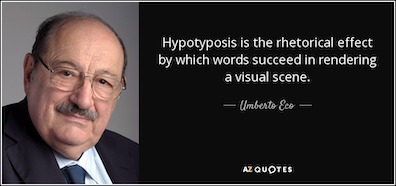Figure of speech. Stephen paints a vivid picture of
his two old women laboring up the spiral stairs inside
Nelson's pillar: "They give two threepenny bits to the
gentleman at the turnstile and begin to waddle slowly up the
winding staircase, grunting, encouraging each other, afraid of
the dark, panting, one asking the other have you the brawn,
praising God and the Blessed Virgin, threatening to come down,
peeping at the airslits. Glory be to God. They had no idea it
was that high." Ancient rhetoricians used the terms hypotyposis
and enargia for lively descriptions of this sort,
which gave orators the ability to create a strong sense of
reality.
Hypotyposis (HYE-po-tye-PO-sis, from Greek hypo- =
under + typos = impression) means "sketching out."
Enargia (en-AR-gee-uh, from Greek enarges = visible,
palpable, manifest) refers to an effect of sensory vividness.
The two terms were used synonymously (along with Latin ones
like descriptio, demonstratio, representatio, and others) to
name the orator's capacity to paint a picture with words,
making something absent seem palpably present. Henry
Peacham says that descriptio "doth expresse and set
forth a thing so plainly and lively, that it seemeth rather
painted in tables, then declared with words, and the mind of
the hearer therby so drawen to an earnest and stedfast
contemplation of the thing described, that he rather thinketh
he seeth it then heareth it." Its "cunning and curious Images
are made so like to the persons which they present, that they
do not onely make a likely shew of life, but also by outward
countenance of the inward spirite and affection."
Stephen's portrait of the two women certainly fulfills these
criteria, though other details in Aeolus and
elsewhere in the novel probably could be claimed as examples,
since hypotyposis is a broad and loosely defined category with
vast relevance to works of literary fiction. It does not seem
relevant, however, to two examples cited by Gilbert and seconded by
Seidman: Professor MacHugh's murmured "The ghost walks"
when Bloom enters the newspaper office, and Stephen's picturing of
some rhyming words in Dante's Comedy as "three
by three, approaching girls." Gilbert calls hypotyposis the
"visionary imagination of things not present as being before
the eyes" and he illustrates his definition with Alexander
Pope's description of a ghostly apparition. He apparently has
confused visualizable scenes with visionary
ones.

